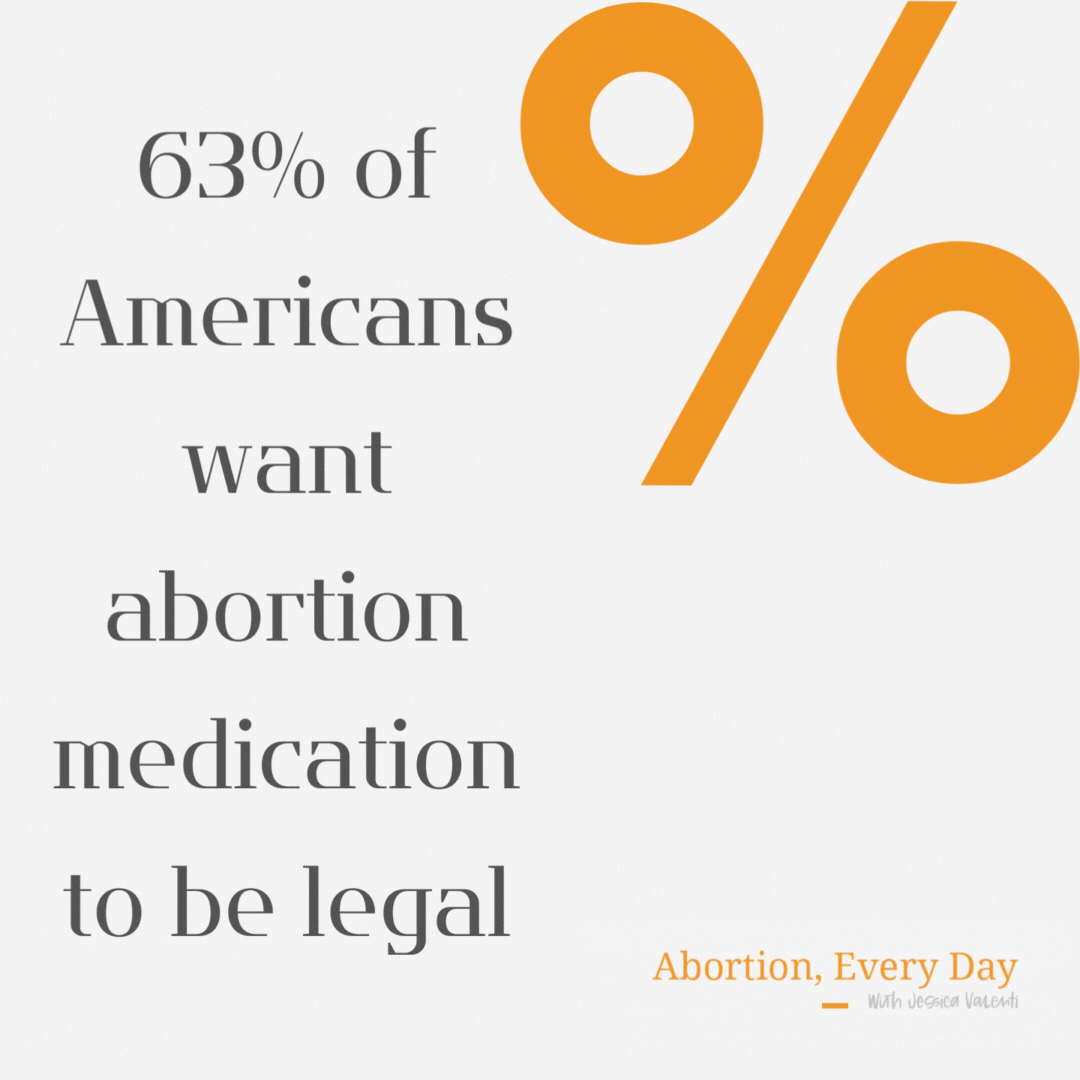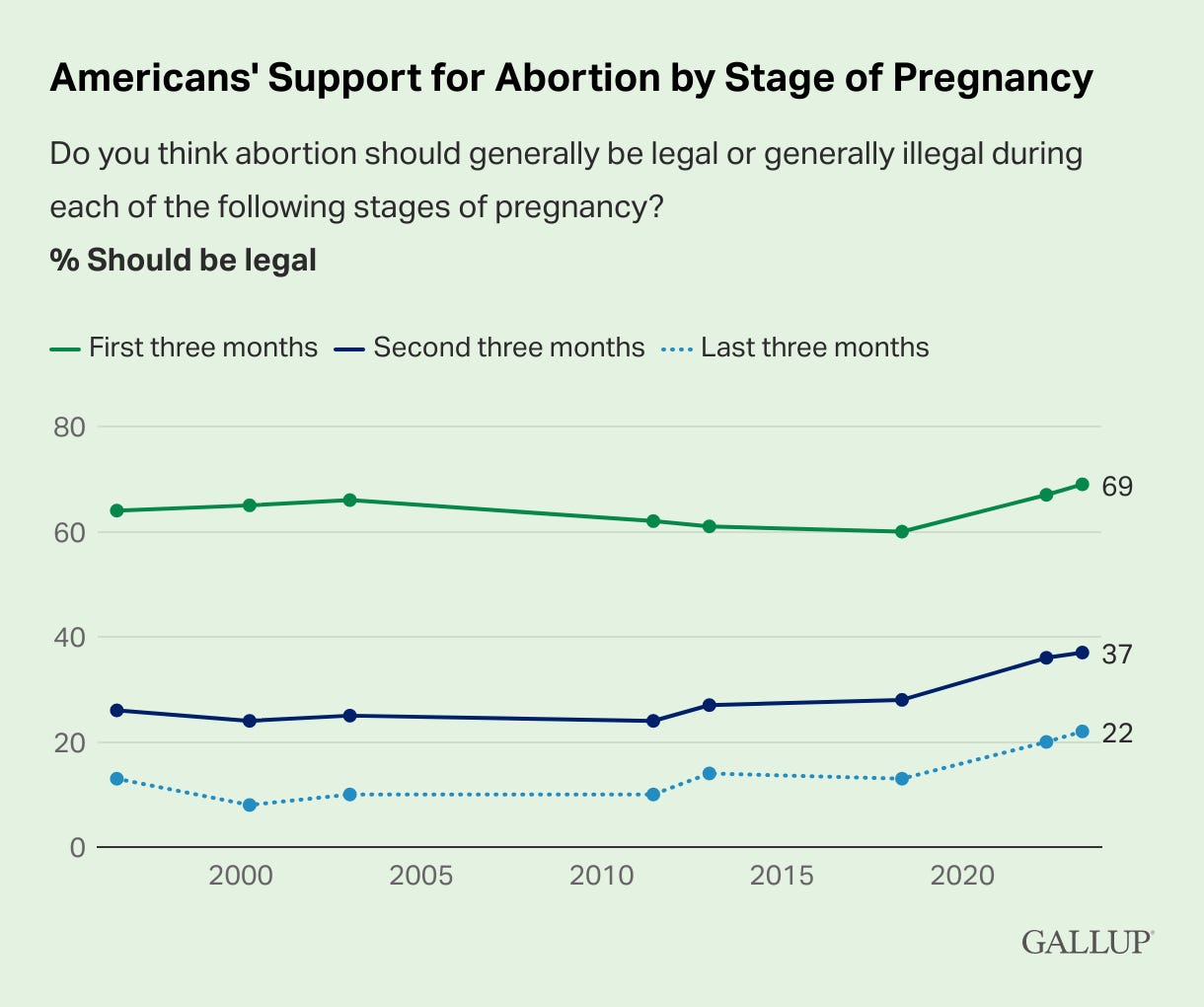https://jessica.substack.com/p/the-week-in-abortion-387?utm_source=substack&utm_medium=email#details
~~ recommended by newestbeginning ~~
First and foremost: Thank you to everyone who commented, shared and reached out about Terry’s story this week. I’m in awe of the young woman who agreed to share her experience with us—despite the very real risks involved—and so grateful to the community here for responding with the love and care she deserved. ‘Terry’ reached out and told me that she was overwhelmed by the support. So truly, thank you.
Care Denied
The stories coming out of anti-choice states are just heartbreaking—and infuriating. In addition to AED’s article about the young woman in Texas denied an abortion despite a horrific fetal abnormality, women with similar experiences came forward this week in Louisiana and Kentucky.
In Kentucky, Heather Maberry was 20 weeks pregnant when her fetus was diagnosed with anencephaly, a fatal abnormality. “I physically can’t and mentally can’t continue carrying her knowing that she's never gonna breathe,” said Maberry. But Kentucky’s abortion ban prevented her from being able to get care. Instead, she had to raise over $6,000 in order to travel to Chicago for an abortion. She doesn’t blame her doctors, she told ABC News, but the politicians:
“I mean most of them are men. They are never going to have to carry a child. They're never going to have to be in the position, they're never gonna be the one that was carrying that baby and had to go through hell.”
And in Louisiana, Brittany Vidrine’s fetus was also diagnosed with anencephaly, and she was also denied care. What’s doubly infuriating is that anencephaly is specifically named in the state’s abortion ban exception for “medically futile” pregnancies—but because of how severe Louisiana’s law is, Vidrine couldn’t find a single doctor willing to provide her an abortion. The risk of criminalization is just too great.
And so after being given perhaps the worst news of her life, Vidrine was forced to leave her two children at home, and drive to Colorado for an abortion. “To have to make this choice and then have to go through everything on top of it was just hurt added to the pile of already hurt we were experiencing,” she said.
This is exactly what I mean when I say that exceptions aren’t real. These laws were written in a way to ensure that exemptions can never be used—that’s the whole point.(If you want an easily shareable video on this case, here’s the TikTok that I published a few days ago.)
Abortion, Every Day has been bringing you vital news and analysis for nearly a year. Help us continue the work by signing up for a paid subscription!
America Supports Abortion
If you need a positive takeaway from the week in abortion—and goodness knows, I sure do—consider the latest Gallup poll showing record-high (and growing!) support for abortion rights: 69% of Americans say that abortion should be generally be legal in the first three months of pregnancy, 63% want abortion medication to be legal, and the majority of Americans also believe that abortion is morally okay.
Conservatives did not like this poll, and so they’re focusing on the drop in support for legal abortion after the first trimester—from 69% to 37%—as proof that their 12- and 15-week abortion bans are ‘reasonable’ restrictions that Americans want. What they don’t to talk about, however, is the fact that just a few years ago, support for abortion in the second trimester was just 28%. That’s a big jump!
In fact, we saw a big increase in general when it comes to support for abortion no mater what stage of pregnancy. It's an indication that Americans are really starting to understand that pregnancy is too complicated to legislate.
Ballot Measure Updates
Some good news in South Dakota this week: A judge blocked portions of a new policy that prevented abortion rights advocates from gathering signatures in key areas. The rule—challenged by Dakotans For Health—prohibited pro-choice petitioners from talking to people in front of certain municipal buildings. The group said that the decision “sends a powerful message that attempts to curtail basic freedoms will not be tolerated.”
The Florida coalition working to get a pro-choice amendment on the ballot is going strong: Floridians Protecting Freedom has collected over 130k signatures to date; they need nearly 900,000 by February in order to get abortion in front of voters in 2024.
In less terrific news, the Ohio Supreme Court ruled this week that Republican’s special August election seeking to raise the standard for ballot measures can go on as planned. (The state GOP is using the special election to try to increase the votes required to pass a ballot measure from a simple majority up to 60%.) Activists in the state have one more month to collect the 413,000 signatures they need.
Legal Updates, Challenges & Lawsuits
Iowa’s Supreme Court declined to reinstate a near-total abortion ban, upholding a 2019 block on the law. That’s not going to stop Republicans, however, from introducing new anti-abortion legislation.
The ACLU announced this week that they’re challenging North Carolina’s recently-passed abortion ban on behalf of abortion providers in the state. In Nebraska, where the ACLU is also challenging the state’s ban, a judge declined to block the law while the case is being heard.
And in North Dakota, where a trigger law was replaced by a new ban in April, abortion providers amended their lawsuit accordingly. A note on language: AED has been flagging the way that Republicans are claiming to ‘clarify’ their abortion bans while doing very little or making the laws even worse: When North Dakota Gov. Doug Burgum signed the new abortion ban into effect, he said that it “clarifies and refines” the trigger law.
More on ‘clarifying’: Texas Republicans passed new legislation this week that they claim will ‘clarify’ the state ban by allowing doctors to give women life-saving abortions. The law comes in the wake of 15 women suing the state after their health and lives were put in danger by the abortion law. As is the case with all of these so-called clarifications, the Texas law doesn’t do shit: The only thing it allows is for doctors to make an affirmative defense after they’re sued or criminalized. (You may remember that term from Tennessee’s law: it requires doctors providing life-saving abortions to break the law and then defend why it was necessary later.)
Finally, in Oregon, Republicans ended their 6-week walkout after reaching a ‘compromise’ that watered down abortion protections for minors in the state. After I reported on this yesterday, I heard from an abortion fund volunteer and board member in the state about just how bad this agreement really is. She pointed out that Democrats also agreed to remove provisions that would have expanded abortion access in rural areas of the state and near college campuses, as well as a ballot referral that would have automatically put an abortion rights amendment in front of voters. (Which means already-overwhelmed pro-choice organizations will need to collect hundreds of thousands of signatures to make it happen.)

Anti-Choice Strategy: DARVO
As I was thinking about the latest in anti-choice strategy this week, I found myself thinking about the abusive tactic DARVO (Deny, Attack, and Reverse Victim and Offender). It’s exactly what we’re seeing from anti-abortion activists and politicians right now: as clinic violence and harassment skyrockets, they’re working hard to make themselves out to be the victims.
We’ve seen attacks in places like Danville, Illinois, where activists recently passed an anti-abortion ordinance. The building site for the clinic has been attacked twice this month, once by a man who drove his car into the site with supplies to set the site on fire. In Wyoming, a patient from Wellspring Health Access (which just reopened after being destroyed by arson) was held against her will at an anti-abortion center, where she was locked in a room. And in California, two men—one of whom is a Marine—were arrested this week for throwing a Molotov cocktail at a Planned Parenthood last year.
While all this happens (and lots, lots more), anti-abortion lawmakers and activists insist that they are the ones who are in danger of pro-choice violence. Republicans have adopted a resolution condemning violence against anti-abortion groups, with Sen. Marco Rubio claiming that “pro-abortion terrorism is sweeping our nation.” Conservative legislators have successfully pressured the Biden administration to use the FACE Act—meant to protect reproductive health clinics from violence and harassment—to prosecute pro-choice activists who tagged anti-abortion centers with graffiti. And the FBI is increasingly investigating pro-choice “domestic terrorism” in what one former agent called a “flawed notion of parity.” (For more reading on all of this, check out Garnet Henderson at ReWire and this piece at The Intercept.)
It’s so incredibly frustrating to watch—especially when you know exactly what they’re playing at. What I find truly terrifying, though, is that while conservatives are pretending to be the victims, they’re also working to make it easier for anti-choice extremists to target abortion patients and providers. I flagged last week, and expanded a bit this week, on the increasing number of legal challenges to buffer zone laws. We’re seeing suit after suit claiming that buffer zones outside of clinics are a violation of free speech: they want to ensure that the people who harass patients are able to get as close to them as possible. It’s abhorrent.
Language Tracking: ‘Consensus’
I’m betting you’re as sick of this word as I am, but I promise this will be short! You know that anti-abortion strategists are using the word ‘consensus’ to both distract from the fact that they’re passing bans against the wishes of voters and to make their restrictions seem as if they’re something Americans really want. Once you start to look for the word—or even the sentiment!—you’ll see it everywhere.
Just this week:
During a town hall for CNN, former New Jersey governor and current Republican presidential candidate Chris Christie said the federal government shouldn’t be involved in abortion “until there’s a consensus around the country.” He went on to say, “I want to see that consensus, and then as president, I want to build off that consensus. Let’s leave it to the states and if a consensus emerges, we’ll know it.” While some pundits suggested that his comments were equivocating, the truth is that we know exactly what he means.
After the Republican mayor of Miami, Francis Suarez, announced his candidacy for president, he explained his support for a 15-week national ban by saying, “We are in a situation where 70% of the country agrees with a limitation of 15 weeks.” The comments are a good reminder that politicians don’t have use the word ‘consensus’ to utilize the strategy behind it.
Quote of the Week
“We cannot allow this tyranny of the minority to dictate the outcomes of other people’s lives.”
~ Julie Burkhart, Wellspring Health Access, speaking to New York Magazine

No comments:
Post a Comment